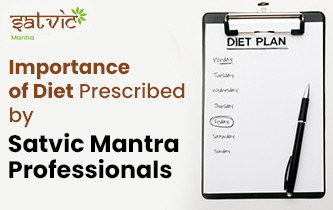Don’t miss to subscribe to our new feeds, kindly fill the form below.

 Chat with Us
Chat with Us

It is important to follow a diet prescribed by a doctor or healthcare professional when suffering from kidney stones because the right diet can help prevent new stones from forming and support the health of your kidneys. Kidney stones are formed when certain substances, such as calcium and oxalate, become concentrated in the urine and form crystals. A diet that is high in these substances can increase the risk of kidney stones. By following a diet that is low in oxalate, salt, protein, and sugar, and that includes plenty of fluids, you can help reduce your risk of forming new stones and support the health of your kidneys.
In addition to helping prevent new stones from forming, a healthy diet can also support the overall health of your kidneys. The kidneys are responsible for filtering waste products and excess fluids from the body, and a healthy diet can help support their function. It's important to note that every person's dietary needs are unique, and what works for one person may not be the best approach for another. It's important to work with a healthcare professional to develop a diet that is tailored to your specific needs and medical history.
If you are suffering from kidney stones, it's important to pay attention to your diet in order to help reduce your risk of future stones and to support the health of your kidneys. The following are some general guidelines for what to eat when you have kidney stones:
Stay hydrated: Drinking plenty of fluids is essential for flushing out excess minerals and other substances that can contribute to kidney stones. Aim for at least 8-10 cups of water per day, and more if you are active or in a hot climate.
Limit your intake of oxalate-rich foods: Some types of kidney stones are formed from excess oxalate, a compound found in certain foods. To reduce your risk of these stones, limit your intake of high-oxalate foods such as spinach, nuts, chocolate, and beets.
Choose calcium-rich foods wisely: Calcium is important for bone health, but if you are prone to calcium oxalate stones, it's important to be selective about the sources of calcium you choose. Good sources of calcium include dairy products, leafy green vegetables, and fortified foods like orange juice. Avoid taking calcium supplements if you have kidney stones, as they may increase your risk of forming new stones.
Limit your intake of salt: A high-salt diet can increase the risk of kidney stones, as well as raise blood pressure and contribute to other health problems. Aim to consume no more than 2,300 milligrams (mg) of sodium per day, or less if you have been advised by a healthcare professional.
Choose protein sources wisely: A high-protein diet can increase the risk of kidney stones, as well as put a strain on your kidneys. If you do consume a lot of protein, choose lean sources such as poultry, fish, and plant-based proteins like beans and legumes.
Avoid sugary drinks: Sugary drinks like soda and fruit juices can contribute to the formation of kidney stones, as well as contribute to other health problems like obesity and type 2 diabetes. Stick to water, unsweetened tea, and other low-sugar beverages.
Eat a balanced diet: In addition to following the above guidelines, it's important to eat a balanced diet that includes a variety of fruits, vegetables, whole grains, and other healthy foods. This will help ensure that you are getting all the nutrients you need to support the health of your kidneys and overall well-being.
Vedas Mantra Healthcare is a company that helps its patients cure kidney stones without surgery. They use a combination of natural remedies and lifestyle changes to support the health of the kidneys and reduce the risk of kidney stones. Some of the methods they may recommend include:
Increasing fluid intake: As mentioned above, staying hydrated is essential for flushing out excess minerals and other substances that can contribute to kidney stones. Vedas Mantra Healthcare may recommend drinking plenty of water, as well as consuming other fluids like unsweetened tea and broth.
Reducing salt intake: A high-salt diet can increase the risk of kidney stones, raise blood pressure, and contribute to other health problems. Vedas Mantra Healthcare may recommend reducing your intake of salty foods and using herbs and spices to flavor your meals instead.
Changing your diet: Vedas Mantra Healthcare may recommend making changes to your diet in order to reduce your risk of kidney stones. This may include reducing your intake of high-oxalate foods, choosing calcium-rich foods wisely, and limiting your intake of protein and sugar.
Making lifestyle changes: In addition to dietary changes, Vedas Mantra Healthcare may recommend making other lifestyle
Share This News